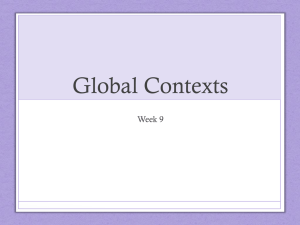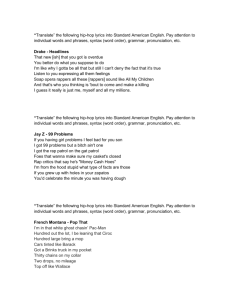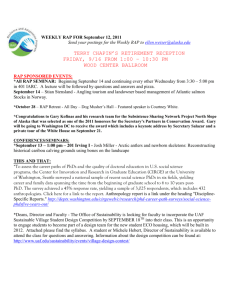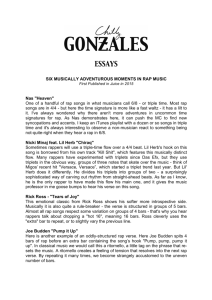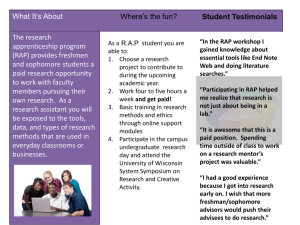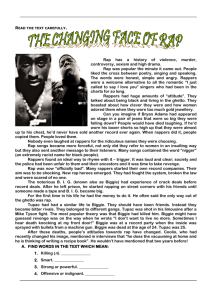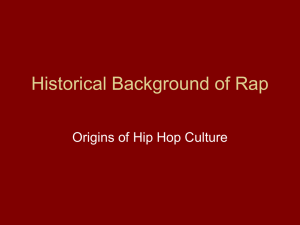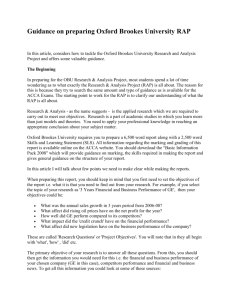The Hostile Gospel and Democratic Faith: Black Feminist
advertisement
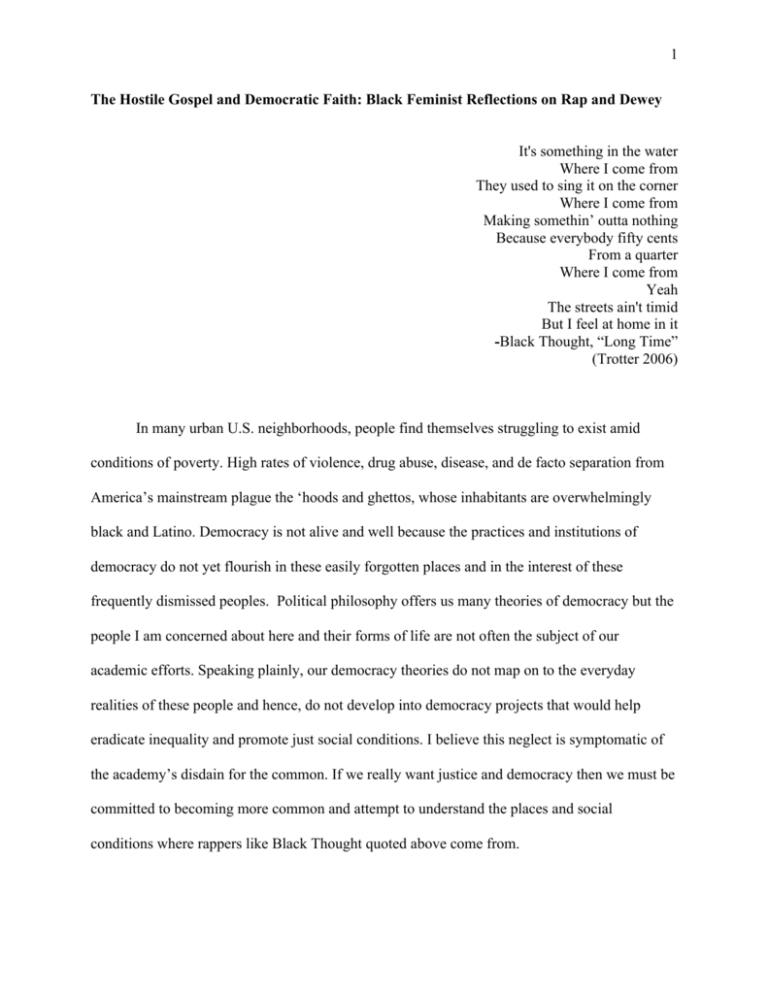
1 The Hostile Gospel and Democratic Faith: Black Feminist Reflections on Rap and Dewey It's something in the water Where I come from They used to sing it on the corner Where I come from Making somethin’ outta nothing Because everybody fifty cents From a quarter Where I come from Yeah The streets ain't timid But I feel at home in it -Black Thought, “Long Time” (Trotter 2006) In many urban U.S. neighborhoods, people find themselves struggling to exist amid conditions of poverty. High rates of violence, drug abuse, disease, and de facto separation from America’s mainstream plague the ‘hoods and ghettos, whose inhabitants are overwhelmingly black and Latino. Democracy is not alive and well because the practices and institutions of democracy do not yet flourish in these easily forgotten places and in the interest of these frequently dismissed peoples. Political philosophy offers us many theories of democracy but the people I am concerned about here and their forms of life are not often the subject of our academic efforts. Speaking plainly, our democracy theories do not map on to the everyday realities of these people and hence, do not develop into democracy projects that would help eradicate inequality and promote just social conditions. I believe this neglect is symptomatic of the academy’s disdain for the common. If we really want justice and democracy then we must be committed to becoming more common and attempt to understand the places and social conditions where rappers like Black Thought quoted above come from. 2 The pragmatist John Dewey held that, “[D]emocracy is a way of life controlled by a working faith in the possibilities of human nature” (Dewey 1939, 341). Dewey characterized democracy as an on-going process that must meet both the demand for individual freedom of choice and the necessities of the cooperative governance of society. Dewey believed that democracy was a process constantly being (or not being) enacted in the practices and habits of everyday people. Dewey’s everyday people may have had different daily challenges and living conditions than the people that I am interested in here, but his assessment of the failure of American democracy in his 1939 address, “Creative Democracy – the Task Before Us,” remains apt. He argued, At the present time, the frontier is moral, not physical…Unused resources are now human rather than material. They are found in the waste of grown men and women who are without chance to work, and in the young men and women who find doors closed where there was once opportunity (Dewey 1984, 225). Historically the opportunities for Latino and African Americans were arguably even less numerous and varied than Dewey’s reflections about post-Depression America reveal, yet his main point about our democracy being in dire moral straights when the life experiences of the common people are not democratic is no less true. When people have little chance to participate in the governing of society and are neglected by society, it is a waste. Dewey understood that our democratic faith and pragmatic impulses require vigilant re-visioning and renewal given the reality of the anti-democratic and oppressive social conditions of our society. In particular, the continued existence and growth of urban inequality challenges our democratic sentiments. We must constantly seek new ways to conduct our democratic experiments that would support an agenda of social justice for the poor and disenfranchised in our cities. Where might we find new resources for our democracy? Cornell West has argued that we must engage urban youth through the cultural form of hip-hop created by those same youth if we 3 are to realize our democratic dreams. On the one hand, hip-hop offers the most accessible articulations of the living conditions of America’s urban youth and their desires. On the other, as a black feminist, hip-hop did not seem like a good place to start in my search for the seeds of practice that would sustain and support creative democratic publics. My brand of black feminism is a theoretical-political position that seeks to recognize the full humanity and equality of all people regardless of their gender, race, class, and sexual orientation. While there are hip-hop artists who create music that is purposively socially conscious, much of the mainstream and well-publicized rap contains cringable content. It seems to offer little more than electronic drumbeats and frustratingly catchy lyrics that celebrate gender inequality, glorify violence, and capitalist product lust. West argues that the capitalist market drives these features of successful hip-hop culture. He is certain that there is something redeemable for democratic projects in hiphop. West claims that hip-hop’s “originating impulse was a fierce disgust with the hypocrisies of adult culture – disgust with the selfishness, capitalist callousness, and xenophobia of the culture of adults, both within the hood and in the society at large” (West 2004, 179). The ‘originating impulse’ of hip-hop has proved compelling to many theorists. They write with passion about the potential of the culture to transcend the market and emerge as a vehicle for positive societal transformation. The powerful influence of the musical aspect of hiphop, rap, is undeniable and many share West’s optimism about the hip-hop generation’s contributions. I am a member of that generation and I acknowledge hip-hop’s pervasive appeal, even as I acknowledge its short comings. It is the case that far more of my peer group and younger people from poor and working class neighborhoods of the inner city like the one where I grew up, are more exposed to and readily relate to the lyrics and performance of rap songs than most other forms of art and mediums of social commentary. Along these lines, Imani Perry 4 refers to hip-hop as an ‘ideological force’ (Perry 2004, 96). One could argue that today there is no greater ideological force in the lives of many poor, urban, black youth and adults. Perry makes the compelling argument that we cannot just dismiss all of hip-hop music because much of it seems to glorify violence. Such a dismal misses a key point about the music and its potential. She writes, The issue is not that hip hop causes violence or whether hip hop causes violence. The United States has a violent culture compounded by devastating health and wealth disparities. The issue is that hip hop carries an ideological message about merit, human worth, and excellence, and if that message glorifies that which ails the community without any internal critique, doesn’t it then become a politically objectionable ideology to be challenged by those seeking justice and equity for black Americans (Perry 2004, 96)? Surely, she is right in her assessment. Hip hop music, hereafter referred to as rap, is not a unified political movement. Its many products are the efforts of many individuals whose inclinations and intentions differ. In its mainstream incarnations, rap, like other cultural forms, is also a product of the social and economic forces that support its dissemination. Interrogating rap as a form of democratic communication requires that we recognize these complexities. Each rapper’s catalogue can be assessed using Perry’s criteria – is it a justice promoting, reflective critique of the social conditions of the community it concerns? In what follows, I assert that rap as a form of democratic communication has political import because of the connection many rappers make between freedom and location. Borrowing from the title of a popular song by the rapper Talib Kweli, I call this function of rap as communication - the hostile gospel (Kweli, 2007). Rap as a critical force that serves both as an outlet for self expression of urban youth that provides hope in the face of bleak life experiences and as a means for humanizing of them to others, is much like gospel church music. Rap is full of references to the plight of the suffering and the possibilities of redemption. But unlike 5 traditional gospel music that can be regarded as a way of coping with circumstances until the sufferer is redeemed, much of rap is a critical form of music that even in its excesses as entertainment, also attempts to present a counterstance or hostile reaction to the dehumanizing effects of urban poverty. As a hostile gospel, rap may serve as a vehicle of social criticism but for it also to become a means for the promotion of democracy, the music must be tied to community movements that will transform the conditions of the locales that rappers so often use as fodder for their rhymes. This analysis may seem to create a strange union between rap and democracy. Connecting black feminist commitments with a Deweyan democratic faith, I hope to add to the ways that those of us interested in the plight of the urban poor in these times may help to promote a more embodied and emplaced democratic practice. Democratic Faith and Rap Origins: Creating Something from Next to Nothing It could be argued that no philosopher has had more faith in the possibility of an inclusive American democracy than Dewey. For all of the idiosyncrasies of Dewey’s democratic faith, what is most compelling about his position is that Dewey truly believed that the fulfillment of America’s democratic potential relied on its efficacy in the everyday lives of all people. Dewey takes as an example of his model of the democratic way of life pioneer America. Even as we temper Dewey’s praise for the pioneer spirit by acknowledging that pioneer communities displaced Native American’s from their lands and established settlements that functioned as closed communities where racial and gender hierarchies were common place, we can appreciate Dewey’s analysis of the ingenuity of the pioneers because what ultimately falls out of the analysis is not an appreciation of the particulars of their prejudices but an emphasis on the 6 processes of decision-making and community ideals of freedom. A similar analysis of rap music’s origins and political possibilities can be made. When the Americans went West, according to Dewey, their daily lives were ones of perpetual struggle. Instead of surrendering to their conditions, Dewey claims that the pioneers were characterized a strong commitment to making their communities viable. The lack of resources led to the creative solutions to problems. The pioneer spirit was a democratic spirit. People struggled not only to make their own way in the harsh West but also took the time to participate in the building and maintenance of communities. They sought individual success while simultaneously being committed to playing a role in the governing of their communities. Dewey’s appreciation of the spirit pioneer democracy emphasizes the capacity of the common, everyday person to be integral to a community and shape its direction. Dewey maintained that, “Pioneer conditions put a high premium upon personal work, skill, ingenuity, initiative and adaptability, and upon neighborly sociability” (Dewey 1984, 304). Parallels between this ideal of the pioneer spirit can be found in hip-hop culture. Hip-hop began as an outlet for poor urban youth. The arts of hip-hop required very little material resources and served as a creative response to the difficulties of their living conditions. Before rap music emerged as the dominant popular aspect of hip-hop, it was just one part of a larger cultural movement that also comprised break dancing, party d-jaying and graffiti. Kids, whose schools had no art programs and could not afford music lessons or art classes, took to the streets and the basements of their neighborhoods and sang and danced and painted and created. Spray paint, cardboard boxes, a set of turn tables and a microphone were fairly inexpensive tools, as well as ingenuous ones. The forms of expression of hip hop have always been readily available. Even after the other forms of hip-hop were eclipsed in popularity by rap in 1990s, the 7 inexpensive ingenuity remained. All across America urban youth continue to use notebooks to write down lyrics and create spaces of performance as simple as street corner ciphers, where they stand in a circle and take turns rapping and basement recording studios where computer programs and the internet continue to make music production more affordable for some than owning an instrument and taking a class. Reminiscent of Dewey on the pioneers, black Feminist hip-hop theorist Gwendolyn Pough praises the creativity of the originators of hip-hop and the possibilities the culture offers. She writes, “Understanding how young people created so much with so little makes it easier to think about how we can continue to build, expand, and improve on the culture” (Pough 2004, 7). The optimism of Pough, West, and other theorists of hip-hop culture, is often predicated upon the assertion that hip-hop is a cultural movement that is more than the ubiquitous rap music that tops music charts. Yet, we must appreciate the dominance of rap as the aforementioned ideological force of the movement and it is worthwhile to consider its potential for democracy projects and to turn our analysis not just to the form of the art but the content. Tie My Hands: Speaking the Truth to Power and Rap Voices It is hard to find a rap CD these days without at least one song about the abhorrent social conditions of the American inner city. Leave it to biographers to determine whether or not all of the rappers who rap about poverty and struggle actually ever lived the lives about which they create music. Black feminist Imani Perry has convincingly written about realism in rap. One of Perry’s most provocative points about rap is that the realism is not merely a question of an individual’s pedigree, or lack thereof, but also a political position. About rap and the “call to keep it real,” she writes, It demands that artists maintain or use symbols asserting their allegiance to black youth populations, or subgroups within that community. The real for hip hoppers means setting 8 the terms for allegiance. It does not disallow fiction, imaginative constructions, or hip hop’s traditional journey into myth. Rather, it is an explicitly ideological stand against selling one’s soul to the devils of capitalism or assimilation as one sells the art form and lives life. The frequent calls in the hip hop community to keep it real not only require the maintenance of an authentic black urban identity; they also constitute a theoretical space that serves as a living testimony to African American experience (Perry 2004, 87). It is important to note that Perry does not suggest that there is one all-encompassing African American experience, but that the rappers are called upon to testify about experiences common to the urban poor. In particular, when ‘keeping it real’ the testimony that rap artists give involve blunt, graphic descriptions of America’s ghettos and the precarious life possibilities of the inhabitants of who are daily confronted with the exercise of oppressive power and criminalization based on the legacy of race and class based discrimination. While there is a subset of rappers whose music is primarily social commentary, even those whose lyrics are largely about making money, the promiscuous conquest of women and the violent reaction to rivals also engage in what Cornel West, following Michel Foucault, calls the democratic practice of “speaking truth to power.” Pop culture scholar Murray Forman joins Pough and West to contend that rap gives “voice” to this generation. Forman argues that the voice of the rap generation serves many of the same purposes of the “coming to voice, coming to power” theorized by bell hooks in her work on the importance of speaking up and out for black feminists. For those theorists who have chosen to take the voices of rap seriously, the critical potential of the music is found in its representations of the lives of people who are either invisible to majority culture because of their race and economic class or made highly visible and vulnerable in a culture of incarceration and criminalization that targets them as an element of suspicion. Examples of rap’s critical voices are easily found. For example, in response to former president George Bush’ initial lackluster response to the catastrophe of Hurricane Katrina, 9 Huston based rappers The Legendary K.O. quoted fellow rapper Kanye West’s controversial statement and released a song on the internet with the title “George Bush Doesn’t Like Black People” (K.O. 2006). In the song, the rappers relates several survival scenarios that were unfortunately too common during the wait for government assistance in New Orleans, where people found themselves living on the roofs of their houses awaiting rescue or swimming through diseased flood water to find life sustaining rations and instead of being helped, were accused of looting. The rapper suspects that the reason why Bush was irresponsible to the citizens affected by Katrina include a class bias and a race bias. The poverty and race of the victims made them forgettable or invisible or worse, expendable in the president’s fiscal priorities. One of the duo raps: [Bush] said, "I know it looks bad, just have to wait" Forgetting folks who too broke to evacuate N----s starving and they dying of thirst I bet he had to go and check on them refineries first Making a killing off the price of gas He would have been up in Connecticut twice as fast After all that we've been through nothing's changed You can call Red Cross but the fact remains that... George Bush ain't a goldigger, but he ain't f----g with no broke n----s (K.O. 2006) The Legendary K.O.’s sentiments have been echoed many times since in rap music and beyond. For West, the ‘moral outrage’ found in rap music is an attempt by a generation of neglected youth to critically confront older generations who do not understand them. Like Rock and Roll before it, rap is characterized as the expression of youth that older adults misunderstand or refuse to understand. In the eighties and early nineties, songs like Will Smith’s “Parent’s Just Don’t Understand,” topped the charts. Nowadays much of popular rap music has taken a decisive turn from the rebellion against parental authority and has focused its gaze on society. Many 10 rappers see themselves as serving a similar social function as the Jewish prophets from whom West draws his inspiration. Rappers often describe themselves as truth-tellers in the face of the status quo. They counter the criticism of their lyrical content with claims that the critical do not understand their realities or worse that their voices are being censored to stop people from hearing about those realities. An example can be found in a song from the platinum selling, New Orleans based rapper, Lil’ Wayne. Most of Lil’ Wayne’s music is prototypical Southern gangster rap. His favorite themes seem to be drugs, rivalries and sex, but like the Legendary K.O., Hurricane Katrina prompted Lil’ Wayne to write a song, which he titled “Tie My Hands.” The song not only makes an indictment against the “jokin” of the former president but also makes claims against older generations and society at large. Lil’ Wayne asserts, “Let the truth be known but they talk that freedom matters and didn’t even leave a ladder” (Carter 2008). That there is no ladder to heaven for those who are struggling is a recurring rap theme. Lil’ Wayne and other rappers make a similar charge as those theorists who claim that the resolution of contemporary race-related problems in America have not and will not be solved with Civil Rights era solutions. While the claims made by Lil’ Wayne and other rappers are often fragmentary and the songs when taken together do not make arguments that would satisfy our philosophical criteria of coherence and non-contradiction, we would be mistaken to believe that the failure to meet those standards means that the social critique given or the experiences related have no merit. Everyday life is an amalgam of contradictions and in its portrayal of the feelings and responses of many common people, rap is, perhaps, even more “real” than our theories of experience. Rap is a music that features both the public critique of society at large but also internal community critiques. The voices of dissatisfaction within rap are not just turned toward former 11 generations or social inequality sustained by larger forces, but also towards other rappers and internal community conditions. As a form of communication, rap, unlike say the news media, creates spaces where disagreement and contradiction are made public and hence, resists easy simplification or reductionism to one voice, even in the portfolio of one rapper.1 Such is the case when we attempt to draw insights for our democracy theory from rap, we must recognize while there are many recurring themes in rap, these recurrences offer themselves up to a myriad interpretations. In my opinion, this is part of rap’s utility. Take the popular theme of success in rap music. Those critical of rap say most rappers just want to become rich and have no desire for capitalism to end. Yet, it could be argued that the obsession with wealth found in rap can be interpreted differently. In the song “Tie My Hands,” Lil’ Wayne raps that he is a success story having used his skills to get paid and that the listener could be next. Rappers as divergent as the Cornel West approved Talib Kweli (they made a series of songs together for West’s latest album) and Lil’ Wayne stress the importance of “getting your paper up” or making money. In Kweli’s Hostile Gospel, he asks, “What the people want?” and the response comes, “They want to live it up” (Kweli 2007). Is Kweli selling out to capitalism and hence contradicting his usually more communitarian lyrics? Instead of giving a simple understand of rappers’ estimation of success, one could argue that rappers are not always advocating unreflective consumerism but pointing out the truth that without money people do not survive in capitalist America. As the rapper Black Thought from the Philadelphia based rap band The Roots remarks, Struck by the luck of the draw Life preservation What I’m hustling’ for. My name’s Black Thought The definition of raw I was born in South Philly 12 On a cement floor I had nothing at all Had to knuckle and brawl They swore I’d fall Be another brick in the wall Another life Full of love That lost That’s silly That’s Philly(Trotter 2006) Black Thought connects the ‘hustlin’ theme of rap with his own survival and the neighborhood where he was raised. His desire to make a living and be successful in spite of expectations of failure and lack of opportunity cannot be reduced to the blanket acceptance of capitalism. Individual survival and the survival of loved ones and group members unite politically conscious rappers and their gangster counterparts. With them we must ask how can we assume we live in a democracy when poverty leads to the malnourishment, subpar education, deplorable living conditions and lack of life opportunities for so many in the inner city? Reppin’ the City: Place and Freedom Matters If the access to funds is limited and existing institutions are corrupt, what else might the people do? Surely we would like the full, radical transformation of society so that wealth would not determine people’s life chances and many rappers would agree. However, many rappers also stress the urgency of making a living and becoming successful, now. Stories of individual success are ubiquitous in rap. Part of the musical form is the battle, where the rapper asserts he or she is more talented lyrically, more successful and rich than his or her opponent. Unlike poets who most frequently practice their art without hubris, part of the form of rap is pride. Much of the posturing that the rapper does involves reppin’ (representing) for the rapper’s hood (neighborhood). Raps democratic potential is made apparent in this reppin’ of the local and the concept of freedom it entails. 13 In his “The Public and Its Problems,” Dewey contended that the democratic public had been eclipsed. The lack of informative communication had made it impossible for a Great community to form opinions and act. The community as a site of interaction, social cooperation and planning did not form. Instead of extending the democratic practices of the frontier when the nation grew, the rise of certain communication technologies and the entertainment that emerged along with them served as a distraction. Dewey argued that a Great Society whose scale exceeded any prior society and its administration became overly technical and the human element that democracy requires was lost. Cornel West makes a related claim about our times in his 2003 Democracy Matters. According to West, the outlets for democratic communication that appear on the surface to have grown in our current era, have actually begun to serve a different function. While the internet and television have drastically democratized communication, in the sense that anyone with access to a computer now has the possibility to retrieve and to post things on the internet, West comments that much of our media serves as a vehicle of entertainment and diversion. West cautions that the prevalence of escapist, diverting entertainment is particularly heinous because it preys on the youth. Rhythmic beats normalize content that lulls the youth and does not encourage social change or responsibility (West 2003, 175-176). Dewey believed that a public formed when individuals could recognize themselves as a part of community where all concerned were aware of the problems involved in maintaining that community and each had a part to play in the resolution of those problems, as well as in the formation of the community’s new projects. Dewey denied the supremacy of the age-old philosophical problem that set up an ‘anti-thesis’ between community and individual (Dewey 1984, 351). Dewey convincingly asserted that individuals are associational beings, hence communities are intimately tied to individual thriving and that groups do not exist without 14 individual members. The problem is not whether we should be concerned with individual freedom or rights or the obligations that communitarians assure us are primary but that we must be concerned with both. Gregory Papas argues that Dewey held a view of democratic freedom that joined the positive and negative views of freedom established by Isaiah Berlin (Berlin 1969). In his reading of Dewey, Papas argues that the noninterference model of negative freedom associated with classical liberalism was not good enough for Dewey. Rather we must include positive freedom in our definition of a desirable life. Positive freedom is the idea that the communities and social conditions of which an individual are a part are as integral to freedom and democracy as autonomous choice. In “The Public and Its Problems,” Dewey asserts that our humanity requires that we attend to our communities and that our humanity is intimately connected to our membership in communities.2 Rappers assert their humanity and that of the people in the hoods they rep for when they broadcast the values and importance of their communities. They may not always succeed in doing this in a democratic manner, but the form of rap itself has democratic potential. Whereas Berlin emphasized the freedom from coercion, Dewey argued that we must attend to our communities for the sake of individuals. As Papas writes “What good is my negative freedom to do and consume when I am unable to intelligently reflect and choose? Democracy requires more than the capacity to go to the mall and choose between varieties of goods” (Papas 2008, 222). Papas connects this with Dewey’s caution that ‘propoganda and entertainment’ had proliferated and eclipsed true democratic communication in his time. Similarly, West claims that much of the content of television and rap music marketed to youth is just such non-democratic communication used to distract and mollify. How might the personal 15 reflections and hostile gospel of rap music be a tool of intelligent communication that is necessary for democracy? Rap narratives about the immobility of the urban poor abound. Rappers constantly repeat their city ties and neighborhood memberships. The importance of the local to rap cannot be over emphasized. Even after many rappers have achieved the economic success and national fame that allows them to move away from their neighbors, they still feel the need to represent for them in their lyrics. The mark of a sell-out, and therefore a rapper to be disparaged, is the abandonment of the hood (Cf. Perry 2004). Successful rappers may move to better homes, but the content of much of their music remains tied to the local, in part due to the pressure exerted by the fans in the communities of their origins, but also because of personal affection and attachment. Brooklyn Marcy housing project raised, rapper Jay-Z has an estimated worth well over 300 million dollars according to Forbes magazine (See Miller 2009), and still mentions his Marcy upbringing in songs, although he tells the listener that he has been “around the world and back again” (Carter 2008). While the attachment to the local can be seen as adherence to a naïve sense of belonging, another reading is possible. Unlike those that would aggressively criticize the local because of its emphasis on the trappings of homogeneous community, it is possible to theorize inclusive community. It is necessary to try to theorize what we can do with the local because people are dependent upon local praxis. Many rap lyrics dispute the bourgeoisie liberal notion that the increase of democracy and freedom is best achieved by creating the conditions that would support the upward mobility of individuals. Belonging to a place is vital, being from somewhere is vital to the urban poor. While they share some social issues with the poor migratory worker and the rural poor, the social reality of the inner city poor is that of streets and blocks. Just because one has the ability to 16 move away, doesn’t mean that one should or could thrive emotionally without the communities from whence they came. The notion of shared fate is alive and well in much rap music. The attachment to home is not unreflective. Many rappers narrate that the ‘hood is both the best and the worst of places. In his narrative of the doubled nature of home, “Habit,” the rapper Mos Def reminisces about time spent with his mother at the laundry mat, fun with his cousins and the frequency of block parties while simultaneously citing that there were “funeral homes packed with dark bodies” and that in the ‘hood there is “less space cause the projects laced with more flaws, Less sleep cause the nights ain't peace, it's more war” (Smith 1999)Yet, Mos Def does not advocate leaving home, rather he asserts that while some of us may be able to move away and that the hoods we rep may be different and present us with difficult conditions, that home, in the form of community, is a valuable, human necessity. He raps, “Son I been plenty places in my life and time, and regardless where home is, son home is mine” (Smith 1999). Dewey argued that affections became fleeting with the increased mobility that technology offered. He admonished, “without abiding attachments associations are too shifting and shaken to permit a public readily to locate and identify itself” (Dewey 1984, 322-323). If we think Dewey is correct that attachments to a place and community are necessary for the formation of a democratic public, than we find one of the keys to building democratic publics in poor urban communities in rap music. Hood reppin’ lyrics resonate because they give value to what the people have. The people cannot all be rich and famous as the glamorous rap life suggests but what they value are friends and families on the streets and blocks of their neighborhoods who support them in the face of a difficult world. These human resources are available even in the poorest communities because they are based upon relationships of trust and attachment. When Mos Def proclaims “home before any place,” in his song “Priority” (Smith 2009), he highlights 17 this moral position found in many rap songs. Rappers like Mos Def connect personal well-being to the social welfare of people who come from where they come from. This position clearly does not require that they also hold that people from other places be damned as critics of localism often suggest. The question then becomes can rap music use this moral claim of attachment to the local to help make the creation of a politically effective, socially creative public possible in the ‘hood? Content-wise many rappers have entertained us with music we ought to object to and adamantly. The voices of urban women and rappers who do not fit the hyper-masculine, heteronormative roles many rappers portray are desperately needed in the music. Understanding this does not diminish the potential of the music to fulfill its democratic promise. The same market forces and community prejudices that create these omissions in popular rap do not control every aspect of the music’s production and dissemination even as they reflect the social reality that makes such omissions acceptable. In fact, the origins of rap and the relative accessibility of its tools make the possibility of the emergence of the unheard voices possible. Fostering the democratic way of life in poor urban areas would only be assisted by the surfacing of these voices. Murray Forman and others have argued that hip-hop creates “subaltern counterpublics,” where the shared experiences of its minority subjects are expressed (Forman 2002, 13). Gwendolyn Pough has argued that rappers ‘bring wreck’ to the public sphere by creating spectacles that humanize the rappers and the other inhabitants of their neighborhoods for whom they claim to speak. She writes,“…rappers bring wreck: they disrupt their way into and make themselves visible in the public sphere with the goal of not only speaking for disenfranchised Black people but also of claiming both a voice and a living for themselves in a society bereft of 18 opportunity for them” (Pough 2004, 27). According to Pough, ‘bringing wreck’ also occurs when female rappers disrupt and challenge stereotypes of women and girls found in mainstream rap by offering different experiences and interpretations of the relationships of women and men in the ‘hood. Rap mirrors the battlegrounds of representation and survival of the everyday conditions of people. If we are to take the articulations of the hopes, desires and experiences of the urban poor seriously then we must theorize how we might conceive of democracy in inner city neighborhoods. Urban poor communities may not be the ideal inclusive communities of democratic dreams, but they are the practical location of the possibility of freedom. Dewey claimed, “Communication can alone create a Great Community. Our Babel is not one of tongue but of the signs and symbols without which shared experience is impossible” (Dewey 1984, 324). Using the language and symbols of their hoods, rappers communicate the reality of those people who are rarely given a public hearing and simultaneously participate in the creation of other publics that do not require mainstream legitimacy to exist. As an art that relies upon a concept of freedom directly linked to community commitments, rap has democratizing potential. Yet, rap as a hostile gospel is not enough to sustain a democratic public. The lack of decision-making force and effectiveness in poor communities by the people who live there is appalling. Any move to make democracy a way of life in these areas would have to be based on the premise, which seems foreign to many theorists and certainly to the formal system of most city governments, that the people in these places have both a right and a capacity to make choices about those places as communities. . 19 Aknowledgements: 1 Cf. Perry 2004. Especially Chapter Two, ‘My Mic Sound Nice: Art, Community, Consciousness.’ Perry’s thoughtful engagement with rap music as both an art form and it’s public import is unparalleled in its level of sophistication and anyone hoping to come to a better understanding of hip-hop should begin here in my opinion. 2 Dewey wrote, “To learn to be human is to develop through the give and take of communication an effective sense of being an individually distinctive member of a community; one who understands and appreciates its beliefs, desires, and methods, and who contributes to a further conversion of organic powers into human resources and values” (Dewey 1984, 332). 20 Sources Berlin, Isaiah. 1969. “Two Concepts of Liberty.” In Four Essays on Liberty. London: Oxford University Press. Trotter, Tariq “Black Thought,” et al. 2006. “Long Time.” Lyrics. The Roots. Game Theory. Universal Records Group. Carter, Dewayne “Lil Wayne” and Robin Thicke. 2008. “Tie My Hands.” Lyrics. The Carter III. Universal Records Group. Carter, Sean “Jay – Z” and Clifford “T.I.” Harris, et al. 2008. “Swagger Like Us.” Paper Trail. Lyrics. Atlantic Records. Dewey, John. 1984. “The Public and Its Problems.” In John Dewey: The Later Works 19251953. Volume 2. Boydston, editor. Carbondale: Southern Illinois University Press. _____. 1988. “Creative Democracy: The Task Before Us.” In John Dewey: The Later Works, 1925-1953. Volume 14. Boydston, editor. Carbondale: Southern Illinois University Press. Forman, Murray. 2002. The ‘Hood Comes First: Race, Space, and Place in Rap and Hip-Hop. Middleton: Wesleyan University Press. Kweli, Talib, et al. 2007. “The Hostile Gospel, Part 1.” Lyrics. Eardrum. Warner Bros. Records. Legendary K.O. 2006. “George Bush Doesn’t Like Black People.”Lyrics. Independently released via the web. Found at http://www.youtube.com/watch?v=LOu_zIiihPI. Assessed June 26, 2009. Miller, Mathew. “Forbes Magazine’s List of 20 Wealthiest Black Americans.” http://www.forbes.com/2009/05/06/richest-black-americans-busienss-billionaires-richestblack-americans.html. Assessed June 26, 2009. Papas, Gregory Fernando. 2008. John Dewey’s Ethics: Democracy as Experience. Bloomington: Indiana University Press. Perry, Imani. 2004. Prophets of the Hood: Politics and Poetics in Hip Hop. Durham: Duke University Press. Pough, Gwendolyn D. 2003. Check It While I Wreck It: Black Womanhood, Hip-Hop Culture, and the Public Sphere. Boston: Northeastern University Press. Smith, Dante and O. Jackson, Jr. 2009. “Priority.” Lyrics. The Ecstatic. Downtown Records. 21 Smith, Dante, W. Irvine and T. Dunn. 1999. “Habitat.” Lyrics. Black on Both Sides. Rukus/Priority Records. West, Cornell. 2004. Democracy Matters: Winning the Fight Against Imperialism. New York: Penquin.
